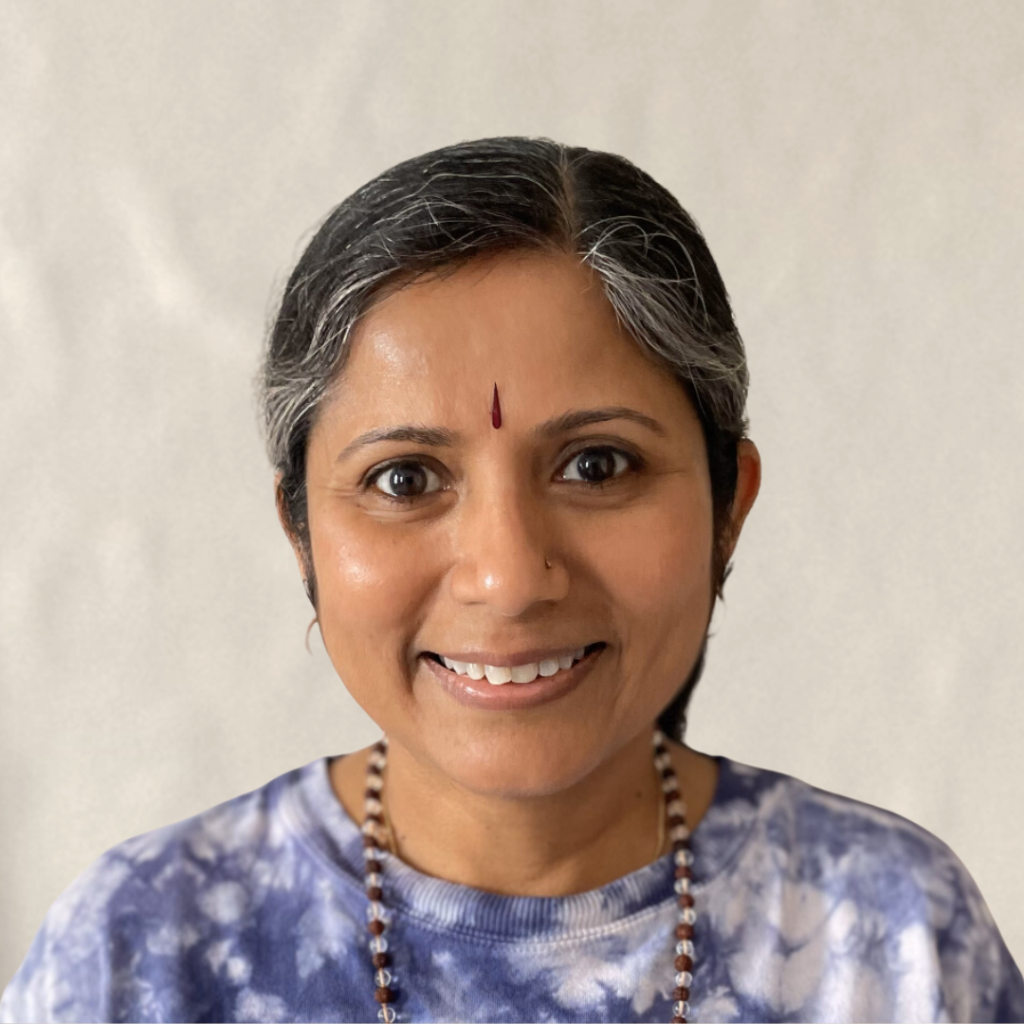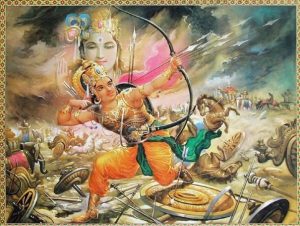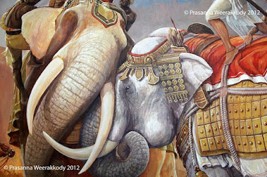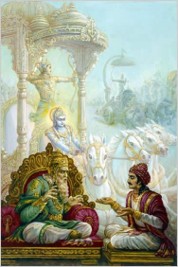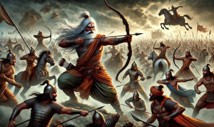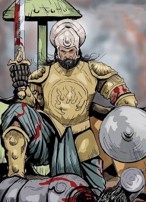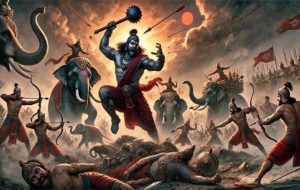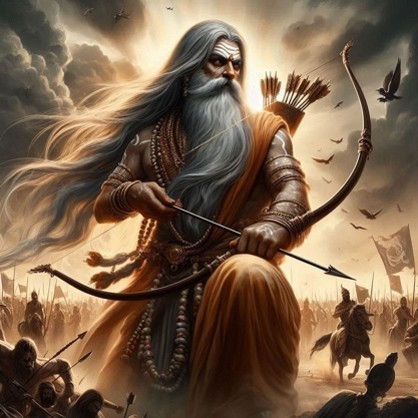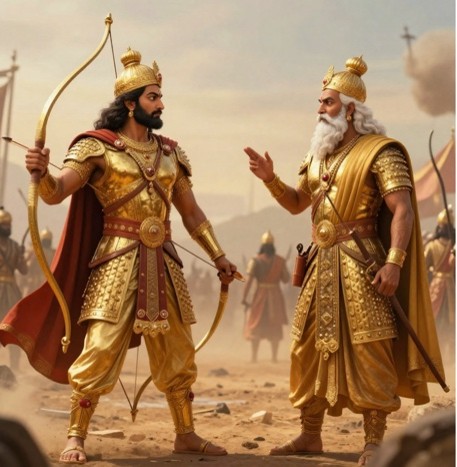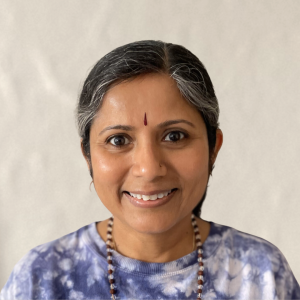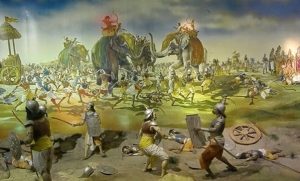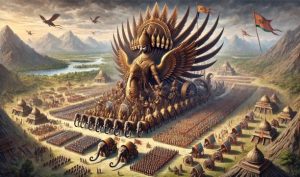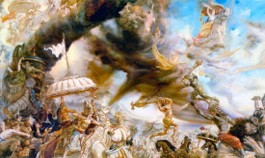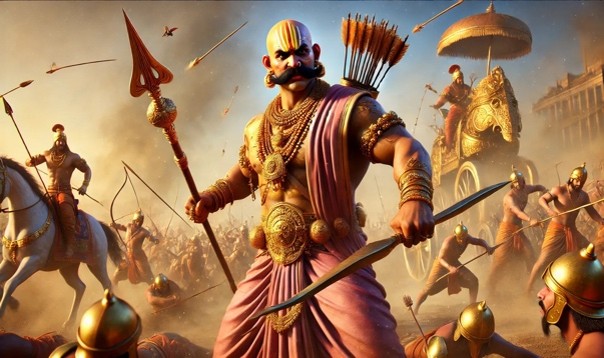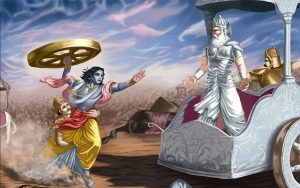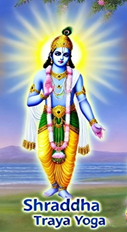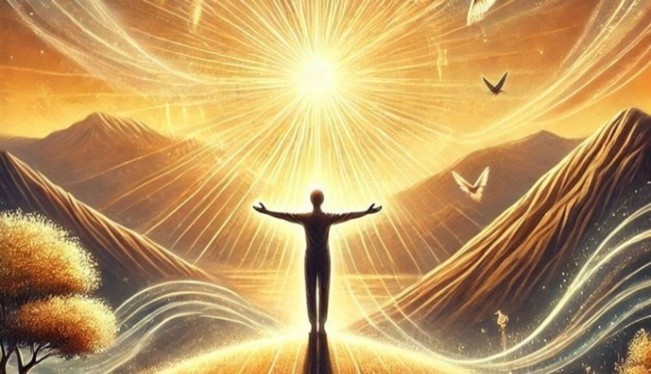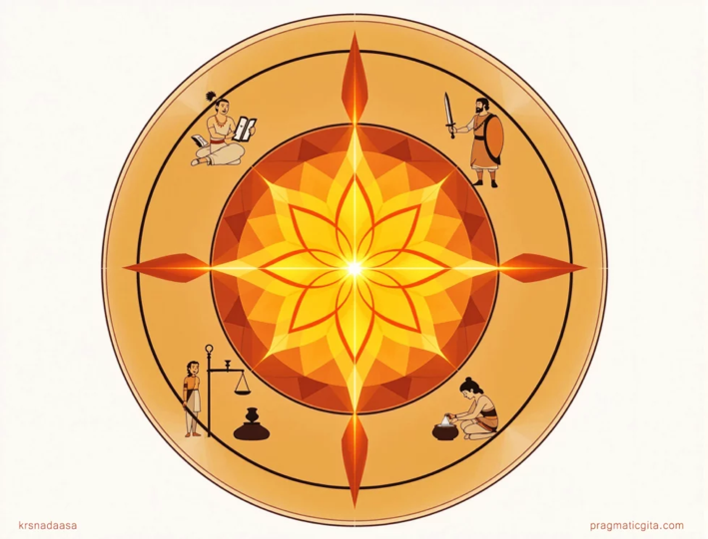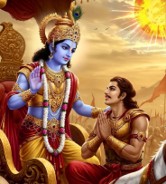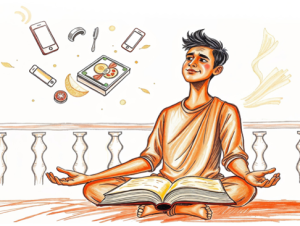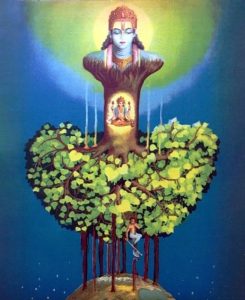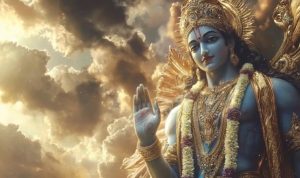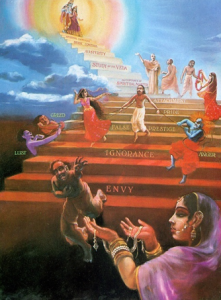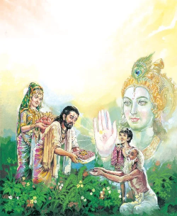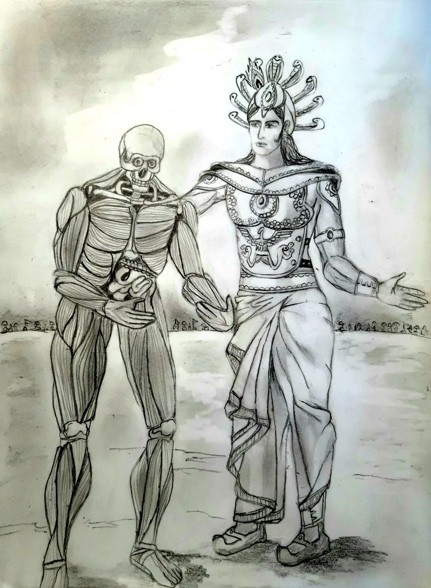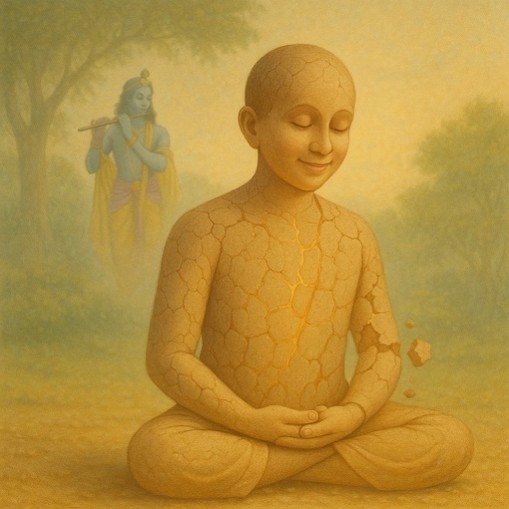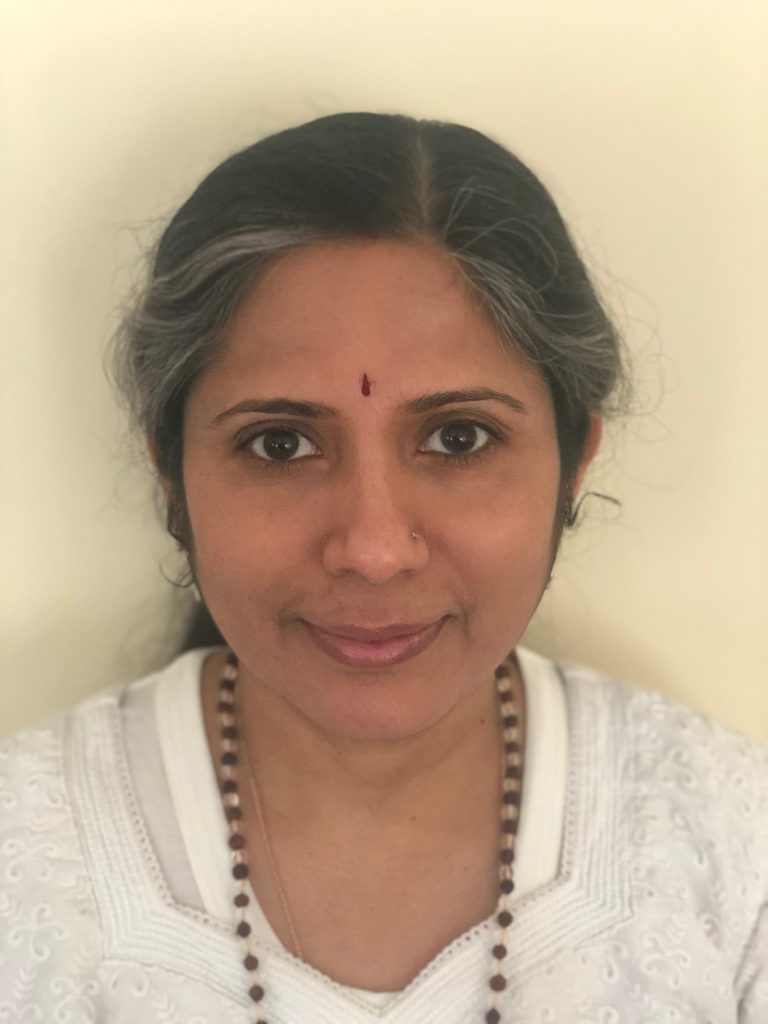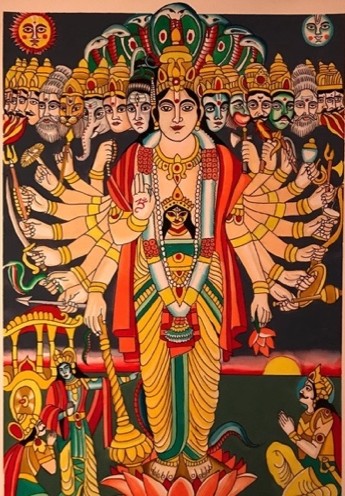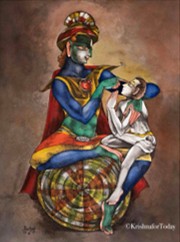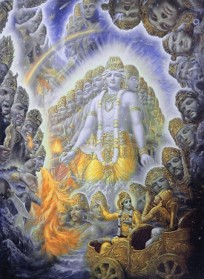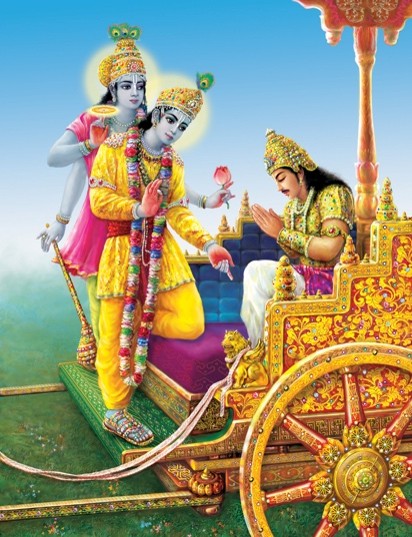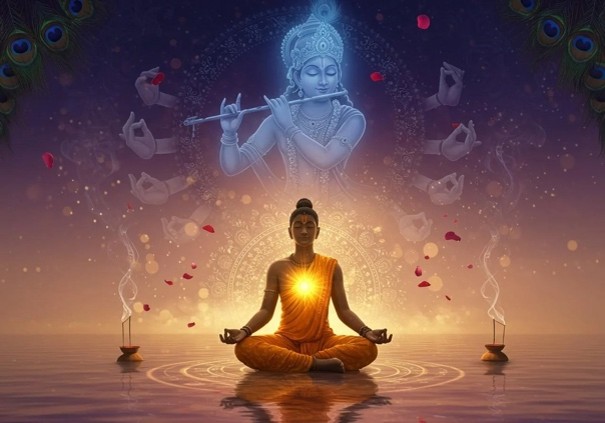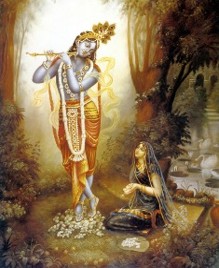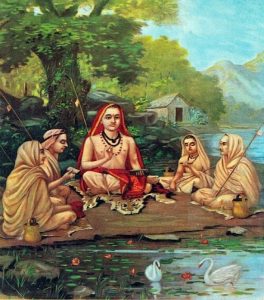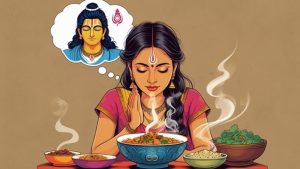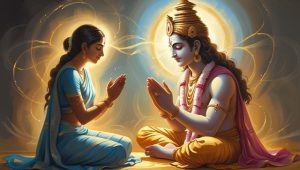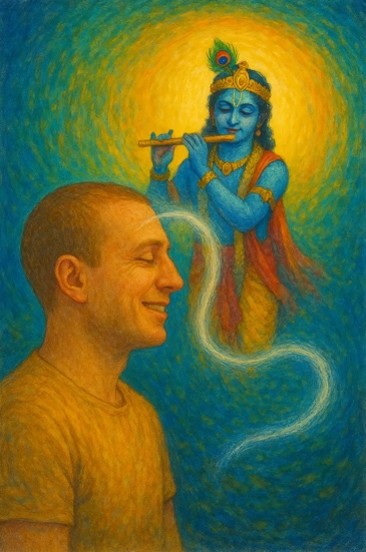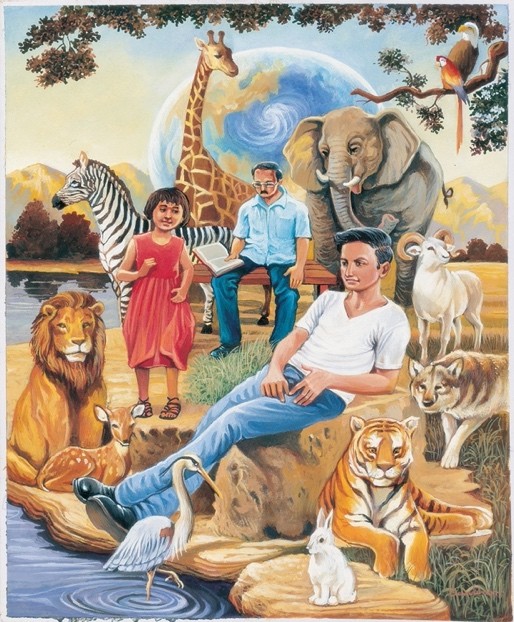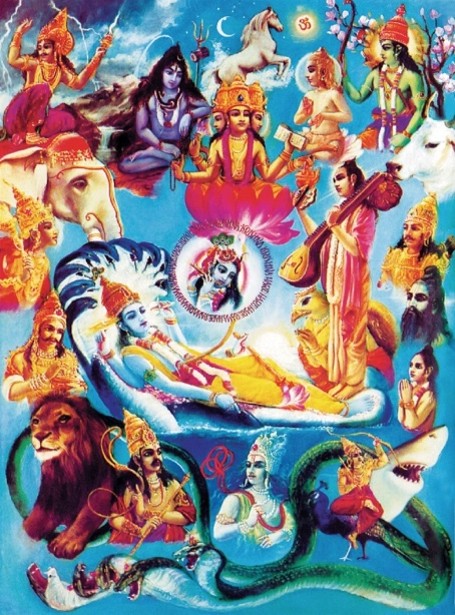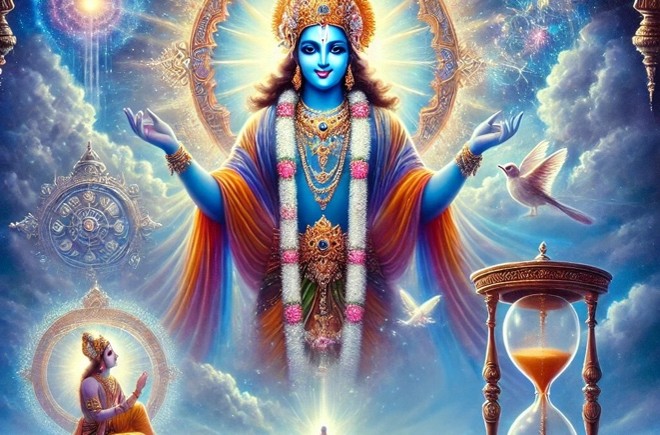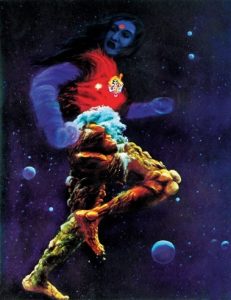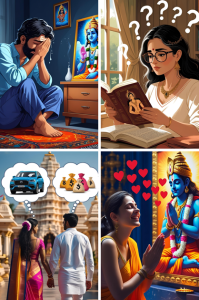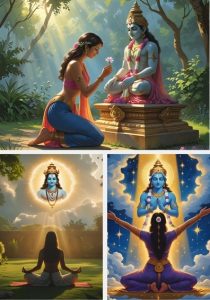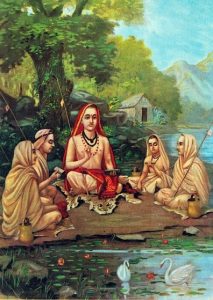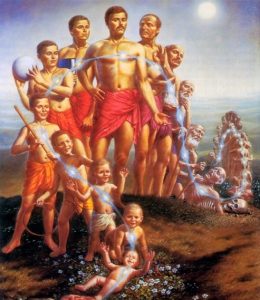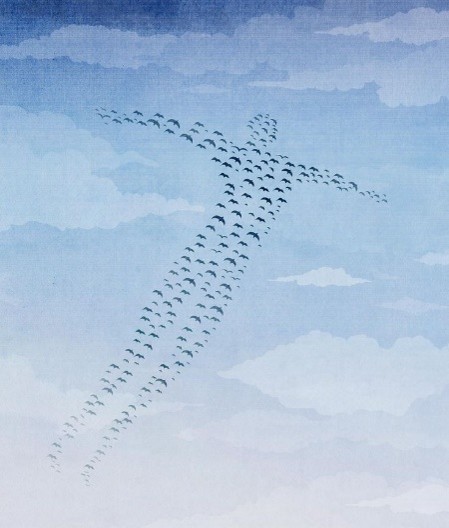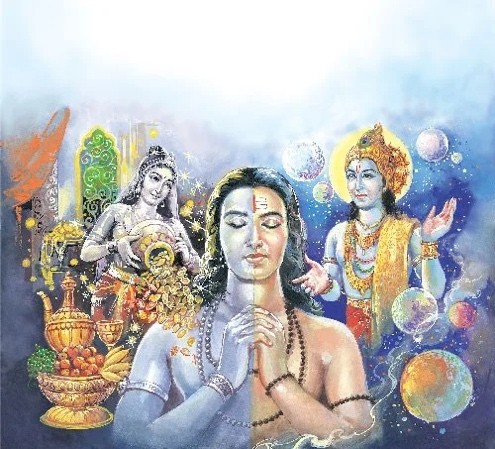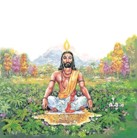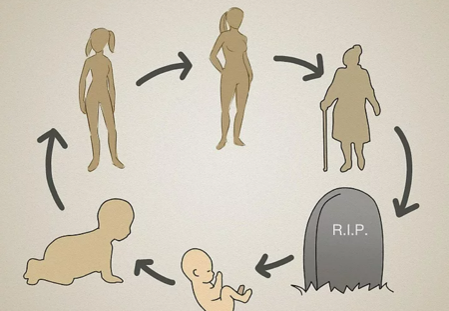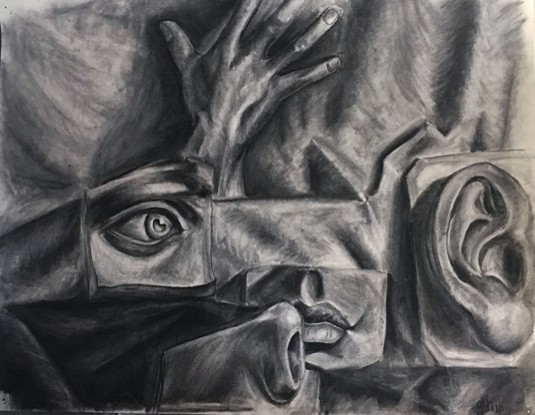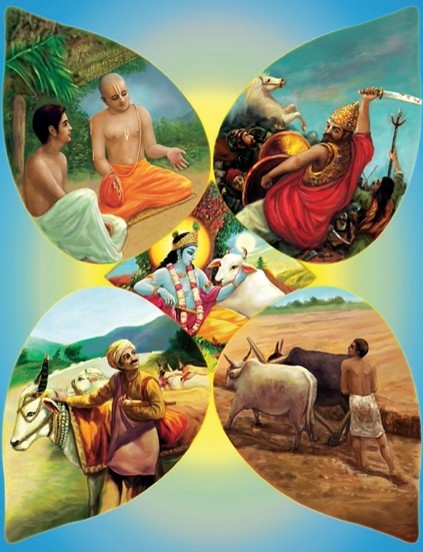By Nirooshitha Sethuram, Yogaratna
Graphics by Sheralee (Shambhavi) Hancherow
Fourth Day of the War
At Kurukshetra, both forces assembled once more in readiness for battle. Each day seemed to merge with the next as the fighting raged on and casualties grew on both sides.
Despite the ongoing struggle, the war showed no sign of ending. The heroes of this grand saga kept forging their destinies amid the turmoil of battle. The Kaurava army, equipped with chariots, elephants and cavalry was poised for battle, resembling a turbulent sky heavy with thunderclouds.
Duryodhana formulated a strategy aimed at causing harm to Arjuna’s son, Abhimanyu. The formation was executed. Upon Abhimanyu’s entry, he was promptly encircled by the opposing forces. Young Abhimanyu, though it was unexpected, confronted the Kauravas with the courage of a lion cub.
Arjuna and Dhrishtadyumna rushed to assist Abhimanyu, sparking a fierce battle. Bhima also arrived promptly at the scene and began defeating the Kaurava warriors who were encircling Abhimanyu.
Duryodhana sent war elephants charging toward Bhima, but Bhima fought them off with his mace. The elephants broke ranks, charging into the Kaurava army and killing a lot of their own foot soldiers.
Duryodhana and his brothers moved forward to confront Bhima, but Bhima’s fury was unstoppable. Bhima killed eight of Duryodhana’s brothers and wounded Duryodhana very badly.
Grieving the loss of his brothers, Duryodhana attacked Bhima with a weapon, temporarily rendering him unconscious. Gadot Gaja stepped in to save his father. Not even Bhishma and Drona could stop Gadot Gaja.
The fourth day’s battle came to an end with this event. Neither side emerged as the definite winner that day.
That evening, Duryodhana approached Bhishma once more to inquire about the factors contributing to the Pandavas’ current advantage. Bhishma told Duryodhana that his hostility and unfairness toward the Pandavas were leading to his downfall. The Pandavas consistently adhered to the principles of dharma. As a result, Krishna was ensuring their safety. Where Krishna is present, dharma prevails. Victory follows dharma.
Bhishma reminded Duryodhana that Bhishma had consistently encouraged Duryodhana to seek reconciliation with the Pandavas. He also cautioned Duryodhana once again, that failure to comply could result in adverse consequences for the Kauravas.
In Hastinapura, Sanjaya was reporting daily to King Dhritarashtra on the war through his divine vision. The king asked for updates on the conflict. Sanjay described everything that had happened throughout the day.
King Dhritarashtra expressed his grief, saying, “Sanjaya, every day you bring me only news of sorrow, defeat, and the deaths of my loved ones. I cannot endure this pain any longer.
“What strategy can possibly save our people now? How can we hope to win this war when fate itself seems to set against us? With events unfolding as they are, how will my sons ever succeed? Bhima killed eight of them today. This situation deeply troubles me.”
Sanjaya replied, “O my king, these events are the result of your decisions. Grieving will not help us. I must speak honestly, even if it causes pain to you. It is crucial to confront reality with bravery. We should observe what unfolds with unwavering attention and remain focused.”
King Dhritarashtra saw that Vidura’s earlier warnings were indeed coming to pass, which filled him with sorrow as he reflected on the good advice he had previously dismissed.
Fifth Day of the War
At dawn, sunlight spread across the weary battlefield at Kurukshetra.
That day, Bhishma arranged his forces in the makara formation, which resembled the shape of a crocodile. Conversely, Dhrishtadyumna arranged his army in a formation resembling the shape of a bird. The battle that took place was called Sankula War, where you choose to fight someone who is equal to you in strength.
The battle commenced with Bhishma initiating an intense offensive, with his arrows descending upon the Pandava forces, resulting in significant casualties. Arjuna acted swiftly, striking Bhishma with precise skill to ease the pressure.
Duryodhana turned to Drona and said, “O Guru, I trust you and Bhishma, so you must take action against the Pandavas.”
Drona replied, “Duryodhana, you are underestimating the strength of the Pandavas. They fight with unity and skill. Above all, Krishna supports them. I’ve warned you many times not to provoke conflict with the Pandavas. Still, you ignored my counsel. Nevertheless, I will do my utmost in battle.”
Drona attacked Satyaki. The battle escalated and Bhima intervened to confront Drona. Satyaki and Bhima engaged in combat with Drona, while Arjuna confronted Ashwathama.
Abhimanyu faced Lakshmana, the son of Duryodhana. Bhishma and Shalya came to join Drona.
When Shikhandi saw what was happening, he stepped forward to assist Bhima. Bhishma immediately left that area of the battlefield, stating that his principles did not allow him to fight someone who had been born a woman.
Duryodhana ordered Bhurishrava to fight Satyaki, making it extremely challenging for Satyaki to overcome his opponent. Bhurishrava was the son of Somadatta and the grandson of Bahlika, fighting on the side of the Kauravas due to a family feud with the Vrishnis, a clan allied with the Pandavas.
Eventually, Satyaki suffered serious injuries, prompting his sons to rush to his aid. They were all killed by Bhurishrava. Bhima saved Satyaki and took him to safety in his chariot.
Arjuna overcame countless warriors, striking fear into those who challenged him. The Pandava army cheered in triumph. When night descended, Bhishma called for a withdrawal, which left the Kauravas discouraged and boosted the Pandavas’ morale, though again neither side emerged as the definite winner of the day.
Sixth Day of the War
Dhrishtadyumna arranged the Pandava army in the crocodile formation while the Kaurava army took a heron formation. Each view served a strategic role, adjusting to changing offensive and defensive needs.
Both strategies and the formations soon fell apart. The charioteer serving Drona was killed. Drona personally took control of the driverless chariot and advanced forcefully through the Pandava army, causing significant destruction.
Bhima demonstrated exceptional skill in combat that day, successfully overcoming and defeating enemy forces. Determined to confront Duryodhana’s brothers, Bhima broke through the enemy lines, searching for each and targeting them individually.
A formidable group of Duryodhana’s brothers rallied together and launched a coordinated assault with the intent to capture him.
Overwhelmed, Bhima lost patience, abandoned his chariot, grabbed his mace and charged into the Kaurava ranks on foot. He cut through soldiers, elephants and horses without distinction, leaving a path of devastation in his wake. His power frightened the elephant army.
The rapid movement of Bhima as he wielded the mace, along with the sound it produced, served as evidence of his tutelage under Balarama. Upon witnessing this, the Kaurava army became gripped with fear.
Observing Bhima’s performance, Bhishma, Drona and Kripacharya each felt a sense of pride, reflecting on his abilities and contemplating whether he could continue to excel in combat. Drona referred to him as his disciple, while Bhishma proudly acknowledged him as his grandson. Kripachariya declared on the field, “I am his clan Guru,” prompting the other two to laugh.
Remembering that Bhima was an opponent, they quickly resumed fighting. Bhima and Duryodhana confronted each other. After an exchange of harsh words, their battle commenced. Bhima struck Duryodhana, knocking him unconscious in his chariot. Kripacharya quickly took him away, saving Duryodhana, which helped prevent a decline in the Kaurava’s morale.
Bhishma, the commander of the Kauravas, and Dhrishtadyumna, the commander of the Pandavas, met face to face in battle. Dhrishtadyumna was fully aware of Bhishma’s strength, as Bhishma had once defeated his own teacher in archery. He effectively neutralized all of Bhishma’s offensive maneuvers, refraining from launching any counterattacks and gradually exhausting his opponent.
Arjuna and Drona met face to face. Drona addressed Arjuna, stating, “Should you defeat me, the honor will be mine.” He encouraged Arjuna not to hesitate in launching his arrows, emphasizing that this conflict was not personal, but rather a battle between righteousness and unrighteousness.
Drona affirmed that even in defeat, true victory would be found in virtue. He concluded by assuring that he would engage, not merely with his strength, but with his utmost effort.
He blessed Arjuna, saying that if he won the battle, he would earn the title “Victorious of the Bow” and receive lasting fame. Arjuna, eager to fulfil his Guru’s wish, released arrows that sliced through the air. Both were exhausted with empty quivers.
Krishna reassured Arjuna, telling him that his actions in battle demonstrated to everyone that he was Drona’s foremost student, encouraging him to fight even more valiantly. On the other side, Nakula and Sahadeva scattered the infantry, as Nakula’s swirling sword and Sahadeva’s spear unleashed chaos across the battlefield.
On the sixth day of the war, the battlefield was filled with corpses of men, horses and elephants. The ground was soaked in blood. As the sun set, the day’s battles ended, leaving everyone exhausted. The war wrapped up with heavy casualties on both sides, as each army readied itself for future conflicts. Again, there was no definite winner of the day.
Duryodhana, deep in thought and grieving his tremendous losses, remained in his tent contemplating what course of action to take next. Meanwhile, upon receiving Sanjay’s somber report, Dhritarashtra expressed his concerns, questioning how his sons could possibly succeed against the formidable strength and virtue of the Pandavas.
More to come…
- Krishna (in background) & Abhimanyu https://glorioushinduism.com/2018/03/05/abhimanyu/
- War elephants https://indus-meetindus.blogspot.com/2016/12/day-4-kurukshetra-war.html
- Dhritarashtra & Sanjaya https://www.reddit.com/r/mahabharata/comments/1h6x6ps/sanjay_recites_to_dhritarashtra/#lightboxhttps://www.reddit.com/r/mahabharata/comments/1h6x6ps/sanjay_recites_to_dhritarashtra/#lightbox
- Drona https://vedickathas.com/dronacharya-mahabharat/https://vedickathas.com/dronacharya-mahabharat/
- Bhurishrava https://www.facebook.com/photo.php?fbid=4241968849153925&set=a.206192014209688&id=100044566713560https://www.facebook.com/photo.php?fbid=4241968849153925&set=a.206192014209688&id=100044566713560
- Bhima https://www.reddit.com/r/mahabharata/comments/1hgx99q/mahabharata_day_4/https://www.reddit.com/r/mahabharata/comments/1hgx99q/mahabharata_day_4/
- Kripacharya https://ca.pinterest.com/pin/2462974791060628/https://ca.pinterest.com/pin/2462974791060628/
- Arjuna and Drona Image by S.A.Hancherow/Canva
